featured
The VA Is Hiring A Contractor To Help Explain Medical Marijuana’s Benefits And Risks For Military Veterans
Published
4 months agoon

The U.S. Department of Veterans Affairs (VA) is looking for contractors to analyze and explain scientific evidence on medical marijuana to clinicians and the general public as part of VA’s Systematically Testing the Evidence of Marijuana (STEM) project.
The work aims to evaluate and allow VA to more clearly communicate cannabis’s potential benefits for conditions like PTSD as well as potential risks around cannabis use disorder and consumption during pregnancy.
On Thursday, the federal agency filed a request on a U.S. General Services Administration website for price quotes from qualified contractors, which follows an initial “sources sought” notice on the planned marijuana science review that VA published last month. The latest filing provides additional details about the scope of work and sets a May 15 deadline for responses.
VA says there are three main goals of the STEM project
- Educate clinicians about the evidence, and its quality, regarding the benefits and harms of cannabis in order to facilitate discussions with their patients
- Identify specific research gaps to help researchers design high-yield studies that will advance the field
- Provide resources for patients and the general public about cannabis-related evidence
Over a yearlong period—which could optionally be extended to two years—the contractor would conduct “literature surveillance” with the goal of creating “living systematic reviews” on five topics, including PTSD, cannabis use during pregnancy, cannabis use disorder, the treatment of cannabis use disorder and cannabis for mood disorders.
For each of those topics, the new posting says, the contractor “will work with a medical librarian to execute a search strategy to identify all newly eligible studies for the topic.” Two researchers will then “independently screen all titles and abstracts” as well as the full text of the documents.
Researchers will then summarize the methods and findings of the eligible studies as well as evaluate them based on quality of evidence and risk of bias.
Those findings, combined with an separate analysis of only randomized controlled trials a topic, would be put into a report, which would be peer reviewed by at least two other independent researchers from that field. Based on feedback, “this review will then turn into a living review, in which the Contractor will develop methods to ensure it is rapidly updated, when needed.”
Work on the project would begin in July of this year, the posting says, and run through the end of next June. The option year would run from July 1, 2026 through June 30, 2027.
Contractors need to “demonstrate 10+ of years’ robust experience in information technology, systematic literature surveillance, systematic review methodology, meta-analysis, and the synthesis of evidence working on government research projects similar in scope,” the new filing says.
The principal investigator for the project is Devan Kansagara, a professor of medicine at Oregon Health and Science University and an internal medicine doctor in the VA Portland Health Care System.
As VA explained in its earlier filing, the new document notes that about 9 percent of military veterans reported using cannabis in the past year, and about 40 percent of those said they used marijuana to treat medical conditions. The trouble comes when veterans try to talk to VA doctors about use of the drug.
“In short, clinicians will encounter patients who are using cannabis or who have questions about using cannabis,” the notice says. “Discussions about cannabis are challenging in part because evidence examining the benefits and harms of cannabis is growing and changing rapidly, and because of the variability in the way the existing evidence base has been interpreted.”
“Currently,” it adds, “there is no comprehensive, independent, updated cannabis evidence resource for the health care sector that synthesizes what is known from research and what is left to learn.”
VA’s existing STEM website is a collaborative project between the federal agency and Oregon Health & Science University’s Center for Evidence-Based Policy. It’s funded by VA’s Office of Rural Health.
VA notes that a quarter of U.S. veterans live in rural areas, meaning “the number of rural Veterans using cannabis is substantial.” The new request says the most commonly cited clinical reasons for cannabis use “are highly relevant to care of rural Veterans and Veterans in general, and include pain, PTSD, anxiety, and insomnia.”
Earlier this year, a separate federally funded study found that 40 percent of military veterans suffering from chronic pain reported using marijuana to treat symptoms.
Most said it helped them deal with pain, mobility and sleep issues, while substantial numbers of veterans also say they used cannabis for PTSD, anxiety and stress. Nearly all participants (98 percent) said healthcare providers should discuss the use of natural products with their patients.
Authors from the University of California, San Francisco, and Yale University noted that the percentage of respondents reporting cannabis use “may represent under-reporting related to the prohibition on cannabis prescribing in the VA as a federal health care system.”
Notably, only about half of respondents overall said they’d discussed natural product use with their healthcare providers. Authors noted, however, that “clinicians and pharmacists generally lack knowledge about NPs, which explains why they may avoid discussions about NPs with their patients.”
At a joint hearing earlier this year, meanwhile, two veterans service organizations submitted testimony voicing support for expanded access to plant-based medicines, including marijuana and psychedelics.
“Currently,” said Allison Jaslow, CEO of Iraq and Afghanistan Veterans of America (IAVA), “veterans who live in states where cannabis has been legalized completely are unable to even be prescribed cannabis for medicinal purposes by their doctor” at the VA.
Jaslow said IAVA is “looking forward” to the reintroduction of a bipartisan bill—the Marijuana Safe Harbor Act—that would temporarily allow veterans to legally possess and use cannabis under federal law, as recommended by doctors in accordance with state law. VA physicians would also be allowed for the first time to issue such recommendations.
Aside from that legislation, there have been veterans-focused cannabis measures already filed in the 119th Congress. That includes a bill sponsored by Rep. Brian Mast (R-FL), co-chair of the Congressional Cannabis Caucus, whose Veterans Equal Access Act would similarly allow VA doctors to recommend medical marijuana to their patients in states where it’s legal.
Other VSOs also addressed marijuana and psychedelics policy with the bicameral committees at previous hearings in February, urging lawmakers to continue to explore the alternative therapeutic options and expedite access if they’re proven to be efficacious.
Research published in 2023 found that more than 90 percent of U.S. military veterans who use medical marijuana reported that it improved their quality of life, with many using cannabis as an alternative to over-the-counter and prescription medications.
In July of last year, a Senate committee urged the VA to explore medical marijuana as an alternative to opioids for veterans, also asking the agency to consider allowing its doctors to formally recommend cannabis to their patients.
As for marijuana and chronic pain, a recently published scientific review concluded that cannabinoids may be useful treatments for various types of chronic pain, in some cases helping to reduce the use of other medications. The paper also said select mixtures of cannabinoids could help minimize undesirable effects of cannabis, such as the psychoactivity of THC.
Published in the journal Medical Cannabis and Cannabinoids and authored by researchers at Penn State College of Medicine, that paper reviewed “the most recent evidence supporting the use of cannabis in the treatment of chronic pain disorders including chronic neuropathic pain, cancer-induced neuropathic pain, chronic musculoskeletal pain, and chronic headaches and migraines.”
Research published earlier this year in the journal Pain also found that marijuana was “comparatively more effective than prescription medications” for treating chronic pain after a three-month period, and that many patients reduced their use of opioid painkillers while using cannabis.
The analysis “was able to determine, using causal inference techniques, that use of medical marijuana for chronic pain under medical supervision is at least as effective and potentially more effective in relationship to patients with chronic pain treated by prescription medications (nonopioid or opioid),” said the report, by authors at the University of Pittsburgh, Harvard Medical School and the National Cancer Institute.
A separate federally funded study found that legalization of marijuana in U.S. states is associated with reduced prescriptions for opioid pain medications among commercially insured adults—indicating a possible substitution effect where patients are choosing to use cannabis instead of prescription drugs to treat pain.
“These results suggest that substitution of cannabis for traditional pain medications increases as the availability of recreational cannabis increases,” authors of that report wrote, noting that there “appears to be a small shift once recreational cannabis becomes legal, but we see stronger results once users can purchase cannabis at recreational dispensaries.”
Other recent research also showed a decline in fatal opioid overdoses in jurisdictions where marijuana was legalized for adults. That study found a “consistent negative relationship” between legalization and fatal overdoses, with more significant effects in states that legalized cannabis earlier in the opioid crisis. Authors estimated that recreational marijuana legalization “is associated with a decrease of approximately 3.5 deaths per 100,000 individuals.”
Another recently published report into prescription opioid use in Utah following the state’s legalization of medical marijuana found that the availability of legal cannabis both reduced opioid use by patients with chronic pain and helped drive down prescription overdose deaths statewide. Overall, results of the study indicated that “cannabis has a substantial role to play in pain management and the reduction of opioid use,” it said.
Yet another study, published in 2023, linked medical marijuana use to lower pain levels and reduced dependence on opioids and other prescription medications. And another, published by the American Medical Association (AMA) last February, found that chronic pain patients who received medical marijuana for longer than a month saw significant reductions in prescribed opioids.
About one in three chronic pain patients reported using cannabis as a treatment option, according to a 2023 AMA-published report. Most of that group said they used cannabis as a substitute for other pain medications, including opioids.
Other research published that year found that letting people buy CBD legally significantly reduced opioid prescription rates, leading to 6.6 percent to 8.1 percent fewer opioid prescriptions.
A 2022 research paper that analyzed Medicaid data on prescription drugs, meanwhile, found that legalizing marijuana for adult use was associated with “significant reductions” in the use of prescription drugs for the treatment of multiple conditions.
A 2023 report linked state-level medical marijuana legalization to reduced opioid payouts to doctors—another datapoint suggesting that patients use cannabis as an alternative to prescription drugs when given legal access.
Researchers in another study, published last year, looked at opioid prescription and mortality rates in Oregon, finding that nearby access to retail marijuana moderately reduced opioid prescriptions, though they observed no corresponding drop in opioid-related deaths.
Other recent research also indicates that cannabis may be an effective substitute for opioids in terms of pain management.
A report published recently in the journal BMJ Open, for instance, compared medical marijuana and opioids for chronic non-cancer pain and found that cannabis “may be similarly effective and result in fewer discontinuations than opioids,” potentially offering comparable relief with a lower likelihood of adverse effects.
Separate research published found that more than half (57 percent) of patients with chronic musculoskeletal pain said cannabis was more effective than other analgesic medications, while 40 percent reported reducing their use of other painkillers since they began using marijuana.
In Minnesota, meanwhile, a state government report this year on chronic pain patients enrolled in the state’s medical marijuana program said recently that participants “are finding a noticeable change in pain relief” within a few months of starting cannabis treatment.
The large-scale study of nearly 10,000 patients also shows that nearly a quarter who were taking other pain relievers reduced the use of those drugs after using medical marijuana.
Another new study on the use of medical marijuana by older patients—age 50 and above—concluded that “cannabis seemed to be a safe and effective treatment” for pain and other conditions.

Author: mscannabiz.com
MScannaBIZ for all you Mississippi Cannabis News and Information.
You may like
-
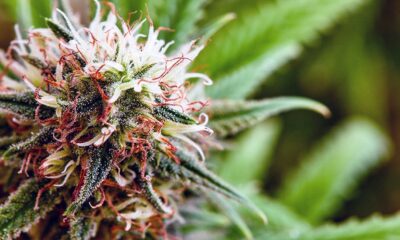

Appellate Court Rules Delta-8, Delta-10 THC Prohibited in Maryland
-


Laws, public perception lagging risk, expert says
-


Federal Marijuana Legalization Bill Deserves Lawmakers’ Support, Letter From ACLU And Other Groups Says
-
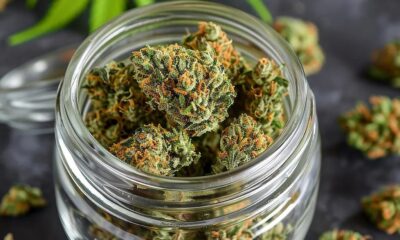

Watertown could create new rules for cannabis shops
-


Rhode Island Opens Applications for 24 Adult-Use Dispensary Licenses
-
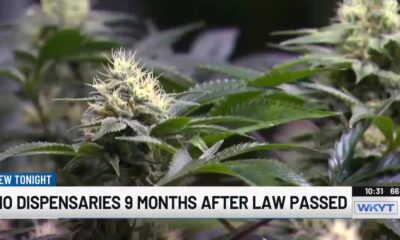

Kentucky still waiting on medical marijuana dispensaries 9 months after law passed
featured
Appellate Court Rules Delta-8, Delta-10 THC Prohibited in Maryland
Published
1 hour agoon
September 15, 2025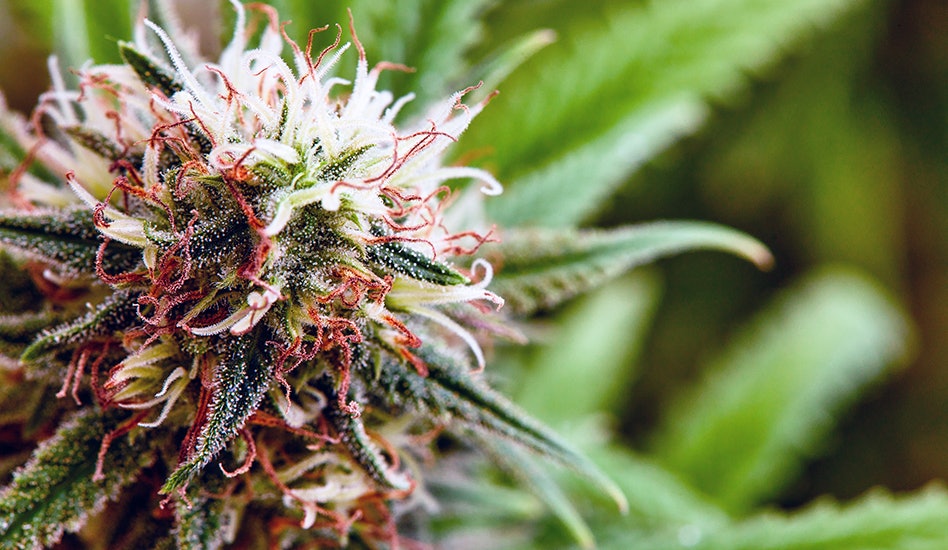
Delta-8 and delta-10 THC are illegal, and state law that prohibits businesses from selling hemp-derived products without a license is constitutional, the Appellate Court of Maryland ruled on Sept. 9.
The ruling reverses a lower court’s decision to grant a preliminary injunction to the Maryland Hemp Coalition and several hemp retailers, producers, farmers and consumers, who had challenged the state’s licensing requirement under the Cannabis Reform Act (CRA) that the Maryland General Assembly passed in 2023 to regulate an adult-use marketplace.
The now-lifted injunction had prevented state officials from enforcing the CRA’s licensing requirement for hemp-related businesses wishing to sell intoxicating products.
Although the state is now allowed to enforce the licensing requirements on hemp businesses, the Maryland Appellate Court ruled that intoxicating products containing synthetic hemp derivatives created in a chemical process remain illegal.
“While this case turns on the state’s ability to enforce the licensing requirement against hemp-derived psychoactive products, the parties have not addressed the legality of these products,” Appellate Judge Daniel A. Friedman wrote. “As we explain below, hemp-derived psychoactive products, so-called delta-8 and delta-10 THC, are now and have always been illegal in Maryland. That the prohibition has been the subject of lax enforcement does not make it legal.”
Furthermore, the judge pointed out that intoxicating products with hemp derivatives took off nationwide after the 2018 Farm Bill federally legalized the commercial cultivation of hemp because U.S. lawmakers did not regulate finished goods in that agricultural legislation.
“This may have contributed to businesses in Maryland and across the country selling these products,” Friedman wrote.
However, the judge explained, the 2018 Farm Bill did not prevent state governments from regulating their hemp marketplaces more stringently than the federal legislation. And, since the Maryland Department of Agriculture submitted Maryland’s state hemp plan to the U.S. Department of Agriculture in 2020, the 2018 Farm Bill does not preempt the state’s regulations on hemp, the court ruled.
The Maryland General Assembly adopted the state’s hemp cultivation program in 2019 and placed restrictions on intoxicating hemp-derived products.
“Based on the regulatory history of hemp and the products derived from it, the legal status of hemp-derived psychoactive products in Maryland prior to the enactment of the Cannabis Reform Act was clear,” Friedman wrote. “While these products may have proliferated during the period of regulatory uncertainty created by the 2018 federal Farm Bill, Maryland law prohibited the use or creation of hemp-derived psychoactive products.
“Significantly, the Cannabis Reform Act bans the sale of most hemp-derived psychoactive products. It does so by prohibiting products ‘not derived from naturally occurring biologically active chemical constituents.’ AB § 36-1102(c). Thus, because hemp-derived psychoactive products, including delta-8 and delta-10 THC, are derived from a chemical process … these products are prohibited.”
The Maryland Hemp Coalition, et al., also argued in the lawsuit that the CRA created an unconstitutional monopoly under Article 41 of the Maryland Declaration of Rights because of a common right exception. Maryland was the first state to adopt a constitutional anti-monopoly provision in 1776, according to the appellate court.
The court considered whether there was a common right to intoxicating hemp-derived products in both the broader cannabis market and the limited hemp market. The court determined there was not a common right in the broader market because of cannabis’s Schedule I federal status under the Controlled Substances Act. The court also determined Maryland’s agricultural hemp laws did not create a common right.
Under the monopoly argument, the court ruled Maryland Hemp Coalition did not attempt to define the relative market—including the size of the market, the products involved, and the size of the monopoly in relation to the market—which Friedman opined was a relevant matter of law.
The court considered several choices for a relevant market:
- All intoxicating products (hemp, marijuana, alcohol, other drugs)
- All products of the cannabis plant (hemp, marijuana, nonintoxicating, intoxicating, intended for human consumption, not intended for consumption)
- Only intoxicating cannabis products (hemp, marijuana)
- Only marijuana products
- Only hemp products
“The determination of the relevant market is neither theoretical nor academic,” Friedman wrote. “It affects whether a litigant can prove their Article 41 claims, it affects the type of analysis a court performs, and it affects whether an alleged monopoly satisfies an exception under Article 41. … In fact, we think the failure to identify the relevant market led to confusion here. That is, the Hemp Coalition’s arguments could apply to at least two markets—the broader cannabis market or the limited hemp-derived psychoactive products market.”
Given the ambiguity, the court ruled the Maryland Hemp Coalition cannot succeed on its monopoly argument that the CRA infringes on a common right.
Furthermore, the court determined that the CRA is permissible under Article 41 because the state’s cannabis regulations are “reasonably required” for the public interests, including consumer safety, youth protections, and social equity initiatives that remedy past discrimination.
“The Maryland General Assembly considered the dangers of both cannabis products generally and hemp-derived psychoactive products specifically and, in response, created a licensing requirement alongside product safety standards under the Cannabis Reform Act,” Friedman wrote. “We hold that the licensing requirement was reasonably required to protect the public health and fits within the public interest exception to Article 41.”
As a result of the court ruling, all Maryland businesses must first obtain a cannabis license before selling any intoxicating cannabinoid products—whether derived from marijuana or hemp.

Author: mscannabiz.com
MScannaBIZ for all you Mississippi Cannabis News and Information.
featured
Federal Marijuana Legalization Bill Deserves Lawmakers’ Support, Letter From ACLU And Other Groups Says
Published
3 hours agoon
September 15, 2025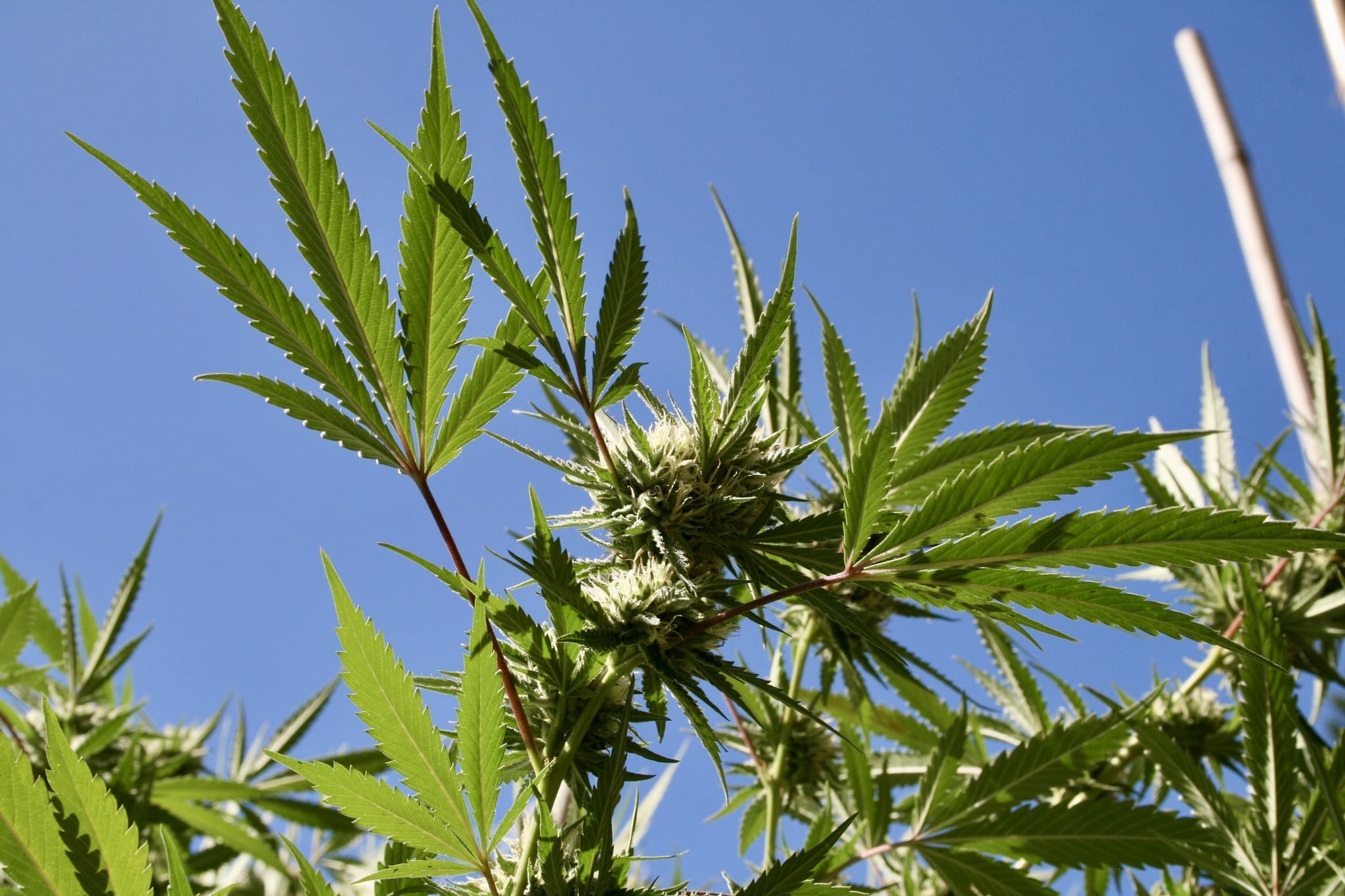
A coalition of drug policy reform and civil rights organizations sent letter urging members of the U.S. House of Representatives to cosponsor a recently filed bill to federally legalize marijuana and promote equity.
The letter, led by the Drug Policy Alliance (DPA), expresses support for the Marijuana Opportunity, Reinvestment and Expungement (MORE) Act, which was reintroduced by Rep. Jerrold Nadler (D-NY) and about three dozen cosponsors late last month.
This marks the fourth session in a row that Nadler has put forward the proposal. It passed the House twice under Democratic control while the sponsor served as chairman of the Judiciary Committee, but it did not advance last session with Republicans in the majority.
“The MORE Act is the leading comprehensive marijuana reform bill in the House that ends federal prohibition, addresses the collateral consequences of federal marijuana criminalization, and takes steps to ensure the regulated marketplace is diverse and inclusive,” the letter—which was also signed by groups such as the ACLU, National Association of Criminal Defense Lawyers, National Association of Social Workers, Service Employees International Union and Southern Poverty Law Center—says.
“For generations, marijuana’s placement on the [Controlled Substances Act, or CSA] has disproportionately inflicted harm upon communities of color and poor people,” the groups wrote.
They noted that the Trump administration is actively considering a proposal to simply reschedule cannabis, which they described as “a policy that would continue federal cannabis criminalization and its harm.”
With that reform pending, it’s “more important than ever for Congress to advance comprehensive legislation to deschedule marijuana from the CSA,” the letter says. “To be clear, as long as marijuana remains anywhere in the CSA, it will still be criminalized at the federal level.”
“Recent news reports have suggested that President Trump may move marijuana to Schedule III of the CSA. While this move would eliminate an unfair tax penalty on the marijuana industry and would be of symbolic importance by recognizing that marijuana has accepted medical use, little else would change. In fact, rescheduling marijuana from Schedule I to Schedule III of CSA will maintain the criminal penalties and collateral consequences that are in effect today. To fully address the conflict between state and federal laws, marijuana must be descheduled from the CSA.”
Other signatories on the letter include Cannabis Regulators of Color Coalition (CRCC), Doctors for Drug Policy Reform, JustLeadershipUSA, Last Prisoner Project (LPP), Law Enforcement Action Partnership (LEAP), Lawyers’ Committee for Civil Rights Under Law, Minority Cannabis Business Association (MCBA), Mission Green, NORML, Students for Sensible Drug Policy (SSDP), Supernova Women and more.
Here are details about the key provisions of the MORE Act:
- The bill would deschedule marijuana by removing it from the list of federally banned drugs under the CSA. However, it would not require states to legalize cannabis and would maintain a level of regulatory discretion up to states.
- Marijuana products would be subject to a federal excise tax, starting at five percent for the first two years after enactment and rising to eight percent by the fifth year of implementation.
- Nobody could be denied federal public benefits based solely on the use or possession of marijuana or past juvenile conviction for a cannabis offense. Federal agencies couldn’t use “past or present cannabis or marijuana use as criteria for granting, denying, or rescinding a security clearance.”
- Noncitizens could not be penalized under federal immigration laws for certain cannabis activity after the enactment of the legislation.
- The bill creates a process for expungements of non-violent federal marijuana convictions.
- Tax revenue from cannabis sales would be placed in a new “Opportunity Trust Fund.” Half of those tax dollars would support a “Community Reinvestment Grant Program” under the Justice Department, 10 percent would support substance misuse treatment programs, 40 percent would go to the federal Small Business Administration (SBA) to support implementation and a newly created equitable licensing grant program.
- The Community Reinvestment Grant Program would “fund eligible non-profit community organizations to provide a variety of services for individuals adversely impacted by the War on Drugs…to include job training, reentry services, legal aid for civil and criminal cases (including for expungement of cannabis convictions), among others.”
- The program would further support funding for substance misuse treatment for people from communities disproportionately impacted by drug criminalization. Those funds would be available for programs offering services to people with substance misuse disorders for any drug, not just cannabis.
- While the bill wouldn’t force states to adopt legalization, it would create incentives to promote equity. For example, SBA would facilitate a program to providing licensing grants to states and localities that have moved to expunge records for people with prior marijuana convictions or “taken steps to eliminate violations or other penalties for persons still under State or local criminal supervision for a cannabis-related offense or violation for conduct now lawful under State or local law.”
- The bill’s proposed Cannabis Restorative Opportunity Program would provide funds “for loans to assist small business concerns that are owned and controlled by individuals adversely impacted by the War on Drugs in eligible States and localities.”
- The comptroller general, in consultation with the head of the U.S. Department of Health and Human Services (HHS), would be required to carry out a study on the demographics of people who have faced federal marijuana convictions, “including information about the age, race, ethnicity, sex, and gender identity.”
- The departments of treasury, justice and the SBA would need to “issue or amend any rules, standard operating procedures, and other legal or policy guidance necessary to carry out implementation of the MORE Act” within one year of its enactment.
- Marijuana producers and importers would also need to obtain a federal permit. And they would be subject to a $1,000 per year federal tax as well for each premise they operate.
- The bill would impose certain packaging and labeling requirements.
- It also prescribes penalties for unlawful conduct such as illegal, unlicensed production or importation of cannabis products.
- The Treasury secretary would be required to carry out a study “on the characteristics of the cannabis industry, with recommendations to improve the regulation of the industry and related taxes.”
- The Bureau of Labor Statistics (BLS) would be required to “regularly compile, maintain, and make public data on the demographics” of marijuana business owners and workers.
- Workers in “safety sensitive” positions, such as those regulated by the Department of Transportation, could continue to be drug tested for THC and face penalties for unauthorized use. Federal workers would also continue to be subject to existing drug testing policies.
- References to “marijuana” or “marihuana” under federal statute would be changed to “cannabis.” It’s unclear if that would also apply to the title of the bill itself.
Getting a bill like the MORE Act through the GOP-controlled House and Senate is a tall task, however. And while Trump previously endorsed a Florida legalization ballot initiative, he’s given little indication he’d be willing to end prohibition altogether at the federal level.
A pending proposal to simply move cannabis from Schedule I to Schedule III under the CSA is still in flux—though the president did recently say a decision was imminent.
—
Marijuana Moment is tracking hundreds of cannabis, psychedelics and drug policy bills in state legislatures and Congress this year. Patreon supporters pledging at least $25/month get access to our interactive maps, charts and hearing calendar so they don’t miss any developments.![]()
Learn more about our marijuana bill tracker and become a supporter on Patreon to get access.
—
Numerous voices within Trump’s circles have expressed differing opinions on the reform.
Most recently, for example, Ben Carson, Trump’s former secretary of the Department of Housing and Urban Development (HUD), said a move to reschedule marijuana would play into plots to “destroy this country.”
Trump’s former press secretary Sean Spicer and his long-time advisor Roger Stone recently traded diverging takes on the prospect of the administration moving forward on marijuana rescheduling.
Stone separately made the case for reform in an op-ed for Marijuana Moment last month.
Retired boxer Mike Tyson, meanwhile, recently spoke about the need for federal marijuana rescheduling on a podcast hosted by the wife of White House Deputy Chief of Staff for Policy Stephen Miller—saying he’s expecting “good news” on the issue soon.
In June, the retired boxer also took to Fox News and delivered a message to the president, urging him to reschedule, and ultimately legalize, marijuana.
That interview came days after Tyson led a letter alongside other professional athletes and celebrities promoting cannabis reform that was sent to Trump, calling for rescheduling marijuana, expanding clemency and allowing licensed cannabis businesses to access the banking system.
Meanwhile, Trump’s former senior advisor Kellyanne Conway has been the “biggest champion” of marijuana rescheduling within the president’s “inner circle,” a GOP congressman recently told Marijuana Moment.
Photo courtesy of Brian Shamblen.

Author: mscannabiz.com
MScannaBIZ for all you Mississippi Cannabis News and Information.
featured
Rhode Island Opens Applications for 24 Adult-Use Dispensary Licenses
Published
4 hours agoon
September 15, 2025
[PRESS RELEASE] – WARWICK, R.I., Sept. 12, 2025 – The Cannabis Control Commission (CCC) opened the application period for adult-use cannabis retail licenses, marking the beginning of the largest expansion to Rhode Island’s cannabis industry. The commission is authorized under the Rhode Island Cannabis Act to license up to 24 retail establishments statewide, divided equally across six geographic zones, making this announcement a defining moment in shaping the state’s cannabis marketplace.
“Today’s announcement represents years of work, collaboration and preparation to ensure Rhode Island has a cannabis marketplace that is safe, transparent, and equitable,” CCC Chairperson Kim Ahern said. “The release of this application and launch of our submission portal is not only about opening doors for businesses but about creating meaningful opportunities for Rhode Islanders while keeping public health and public safety at the center of everything we do.”
With only 24 retail licenses available statewide, the launch of the application process is expected to draw significant interest from prospective applicants. Together with the Social Equity Applicant Status Certification Portal, which opened in August, the application process reflects the CCC’s deliberate steps toward building a cannabis industry that prioritizes economic opportunity, equity and fairness in Rhode Island.
“Rhode Island’s cannabis market is poised for growth, and this application is helping us do exactly that,” Gov. Dan McKee said. “As we expand the cannabis industry here in the Ocean State, we’re opening the doors to new investment, new good-paying jobs, and new opportunities for our economy.”
Adult-use retail licenses will authorize sales of cannabis products to adults 21 and older. By releasing the application and opening the submission portal simultaneously, the commission is providing applicants with a transparent process while reinforcing its commitment to accountability and access.
“Today’s release of the adult-use retail license application reflects the commission’s commitment to equity and accountability,” Commissioner Layi Oduyingbo said. “This framework provides applicants with the information they need while reinforcing our responsibility to safeguard public health and consumer safety.”
Commissioner Robert Jacquard said, “The commission aims to make this application process as business-friendly as possible, while upholding standards that will protect public health.”
To ensure the process is fair and accessible, the commission and Cannabis Office will provide technical assistance resources and ongoing guidance for prospective applicants. Applications will be accepted until 4 p.m. on Dec. 29, 2025.
“This is a milestone that reflects the dedication and perseverance of so many people,” Cannabis Office Administrator Michelle Reddish said. “From lawmakers and advocates to community members and our dedicated staff, countless individuals have helped build the foundation for this moment. By publishing the application today, we are taking a historic step toward building a cannabis marketplace that serves consumers, supports equity and advances public health in Rhode Island.”
The adult-use retail license application is available on the commission’s website at www.ccc.ri.gov/auapp.

Author: mscannabiz.com
MScannaBIZ for all you Mississippi Cannabis News and Information.

Appellate Court Rules Delta-8, Delta-10 THC Prohibited in Maryland

Laws, public perception lagging risk, expert says

Federal Marijuana Legalization Bill Deserves Lawmakers’ Support, Letter From ACLU And Other Groups Says

Watertown could create new rules for cannabis shops

Rhode Island Opens Applications for 24 Adult-Use Dispensary Licenses

Kentucky still waiting on medical marijuana dispensaries 9 months after law passed

Can LSD Battle Anxiety? The Answer Is Yes, According to Science

Six hurt in shooting at marijuana event in SF's Bayview

Kentucky Medical Marijuana Dispensaries Should Be Stocked With Products Ready For Sale By Next Month, Top State Official Says

Deputies: 3,500 child sex abuse images, marijuana grow operation found in NC home raid

Regulators Ready to Enforce Cannabis Laws on Hemp THC Retailers in Maryland

California reaps over $250 million from 2nd Quarter cannabis sales

Meet the World’s First Cannabis Rugby Team: Crewmen 7’s Tackle Stigma Head-On

Texas Supreme Court Refuses To Take Up Marijuana Case Challenging State’s Rejection Of Local Decriminalization Law

California Passes Bill to Ban Intoxicating Hemp Products Outside Cannabis Market

Pending Federal Hemp Legislation Could Reshape The Legal Industry By Banning Some Products (Op-Ed)

Verano Proposes to Redomicile Parent Company From British Columbia to Nevada

8,000 cannabis plants seized from illegal Bradford grow-op

New York Lawmakers Schedule Psychedelics-Focused Hearing To Discuss ‘Medicinal Value And Risks’ Of Psilocybin

Curaleaf Opens Cannabis Dispensaries in Florida, Ohio

How to Protect Your Outdoor Cannabis Crops From Pests

Feds provide anti-cannabis group a platform to bash legalization (Newsletter: September 15, 2025)

Dozen arrested after south Mississippi bust for illegal sales to underage customers

The Toking Traveler: Why Amsterdam Weed Is Mostly Boof

Alert: Department of Cannabis Control updates data dashboards with full data for 2023

Connecticut Appoints The US’s First Cannabis Ombudsperson – Yes there is a pun in there and I’m Sure Erin Kirk Is Going To Hear It More Than Once!

5 best CBD creams of 2024 by Leafly

EU initiative begins bid to open access to psychedelic therapies
New Study Analyzes the Effects of THCV, CBD on Weight Loss

Free delta-9 gummies from Bay Smokes

Discover New York’s dankest cannabis brands [September 2024]

5 best autoflower seed banks of 2024 by Leafly

Press Release: CANNRA Calls for Farm Bill to Clarify Existing State Authority to Regulate Hemp Products

Curaleaf Start Process Of Getting Their Claws Into The UK’s National Health System – With Former MP (Resigned Today 30/5/24) As The Front Man

May 2024 Leafly HighLight: Pink Runtz strain

Local medical cannabis dispensary reacts to MSDH pulling Rapid Analytics License – WLBT

Recreational cannabis on ballot for third time in South Dakota

5 best THC drinks of 2024 by Leafly

Horn Lake denies cannabis dispensary request to allow sale of drug paraphernalia and Sunday sales | News

Mississippi city official pleads guilty to selling fake CBD products

6 best CBD gummies of 2024 by Leafly

Nevada CCB to Accept Applications for Cannabis Establishments in White Pine County – “Only one cultivation and one production license will be awarded in White Pine County”

The Daily Hit: October 2, 2024

5 best delta-9 THC gummies of 2024 by Leafly

Weekly Update: Monday, May 13, 2024 including, New Guide for Renewals & May Board meeting application deadline

PRESS RELEASE : Justice Department Submits Proposed Regulation to Reschedule Marijuana

5 best THCA flower of 2024 by Leafly

People In This State Googled ‘Medical Marijuana’ The Most, Study Shows
Trending
-

 California Cannabis Updates1 year ago
California Cannabis Updates1 year agoAlert: Department of Cannabis Control updates data dashboards with full data for 2023
-

 Breaking News1 year ago
Breaking News1 year agoConnecticut Appoints The US’s First Cannabis Ombudsperson – Yes there is a pun in there and I’m Sure Erin Kirk Is Going To Hear It More Than Once!
-

 best list1 year ago
best list1 year ago5 best CBD creams of 2024 by Leafly
-

 Business12 months ago
Business12 months agoEU initiative begins bid to open access to psychedelic therapies
-

 cbd1 year ago
cbd1 year agoNew Study Analyzes the Effects of THCV, CBD on Weight Loss
-

 Bay Smokes1 year ago
Bay Smokes1 year agoFree delta-9 gummies from Bay Smokes
-

 cannabis brands12 months ago
cannabis brands12 months agoDiscover New York’s dankest cannabis brands [September 2024]
-

 autoflower seeds12 months ago
autoflower seeds12 months ago5 best autoflower seed banks of 2024 by Leafly




